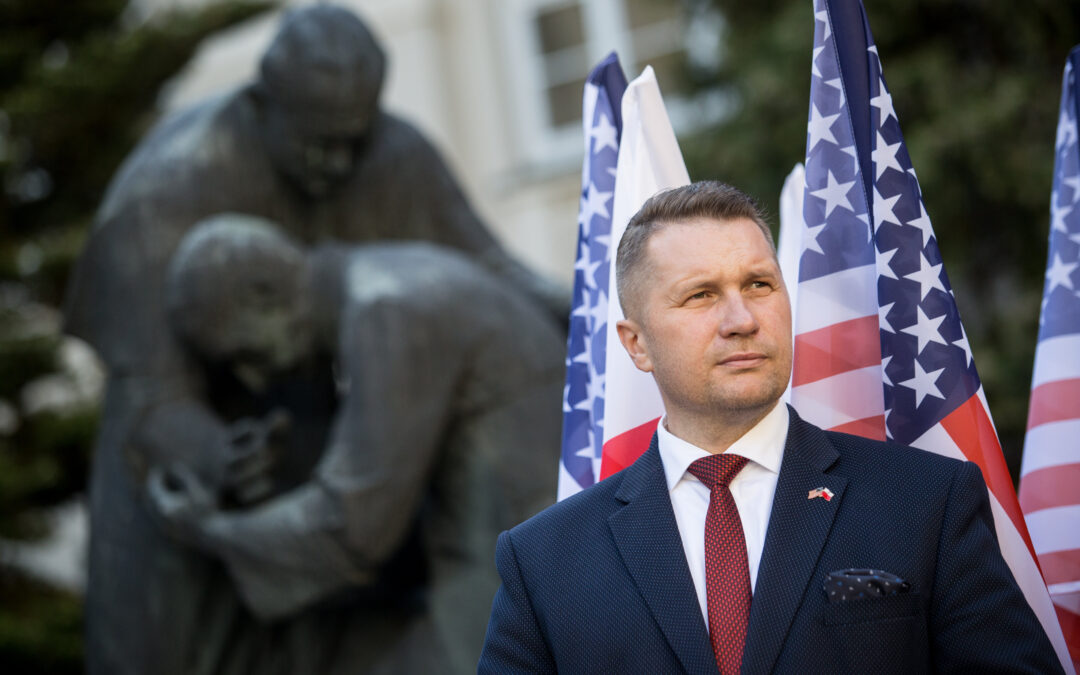Over 170 academics from around the world – including scholars from Harvard, Oxford and the Sorbonne – have called for an international boycott of Poland’s recently appointed education and science minister, Przemysław Czarnek, due to his “homophobic, xenophobic and misogynistic views”.
The signatories – listed in full here – provide 14 pages of examples of statements and actions by Czarnek. Among them are his claims that “LGBT ideology comes from the same roots as Nazism” and that its adherents “are not equal to normal people” so we should “stop listening to this idiocy about human rights or equality”.
The authors of the petition call for “an official boycott and forthright ostracism” of Czarnek. They appeal to European and American politicians responsible for education and academic research not to invite Czarnek and his officials to meetings, nor to participate in any that he attends.
They also urge close monitoring of education- and research-related expenditure by the Polish government, especially spending financed by European funds, in order to “prevent subsidising institutions and individuals that propagate views and undertake actions fundamentally contrary to the values upon which the international community has been built”.
Czarnek himself has not responded to any of the specific claims, simply tweeting that they are “insulting accusations”. He then wished the signatories of the petition, which was published on 23 December, “peace and happiness for Christmas” and said he would pray for them.
Wow!!! Gross, Grabowski, Krzemiński, Płatek… – wszystkim Państwu sygnatariuszom tych znieważających oskarżeń życzę po chrześcijańsku, aby Boża Dziecina napełniała Państwa serca pokojem i radością. Błogosławieństwa Bożego dla Państwa na każdy dzień – pomodlę się o to na Pasterce https://t.co/gBoho258iO
— Przemysław Czarnek (@CzarnekP) December 24, 2020
Czarnek, an MP from the ruling national-conservative Law and Justice (PiS) party and a legal scholar from the Catholic University of Lublin (KUL), was unexpectedly nominated as the new minister in charge of schools, universities and research in October.
The appointment immediately drew criticism due in particular to Czarnek’s views on LGBT people and women, who he says should prioritise having children ahead of professional careers because that is what “God called on them to do”.
He has also attended and spoken at a march of the National Radical Camp (ONR), an ultranationalist group descended from an antisemitic interwar organisation of the same name and which today calls for an “ethnically homogeneous” Poland.
Oto nowy minister edukacji, nauki i szkolnictwa wyższego (źródło: https://t.co/qYFoANMki9) #ONR #Czarnek #MEN #MNiSW pic.twitter.com/kOjuZiqFkU
— Chmielewska-Szlajfer (@HChSz) October 19, 2020
Hundreds of academics in Poland have signed letters and petitions opposing Czarnek’s appointment, and there have also been protests by some university students and school pupils.
Since taking up his post, Czarnek has pledged to fight the “dictatorship of left-liberal views” that he claims “dominates” in universities and has begun to infiltrate schools. He argues that conservative and Christian views have long been unjustly disdained in academic environments.
Following the emergence of mass protests in October against a constitutional court ruling that introduces a near-total ban on abortion in Poland, Czarnek threatened to cut funding to universities that had supported the demonstrations and made it easier for staff and students to attend them.
In the latest appeal by international academics, the signatories describe Czarnek as a “a right-wing moral crusader” and “ruthless party apparatchik” for the “pro-authoritarian populists currently in power in Poland”.
They note that, when discussing the dangers of “LGBT ideology”, he has called for the “defence of the family from such decay, depravation [and] immoral conduct”. He also says that “promoting homosexuality [and] homosexual unions is socially harmful”.
As examples of his “Catholic fundamentalism”, the scholars point to Czarnek’s condemnation of “feminism reaping a deadly harvest” by seeking to undermine the “fundamental procreative function of the family”. They also note that he has spoken of the “obvious necessity to apply…corporal punishment” to children.
Main image credit: Jakub Orzechowski / Agencja Gazeta

Agnieszka Wądołowska is deputy editor-in-chief of Notes from Poland. She is a member of the European Press Prize’s preparatory committee. She was 2022 Fellow at the Entrepreneurial Journalism Creators Program at City University of New York. In 2024, she graduated from the Advanced Leadership Programme for Top Talents at the Center for Leadership. She has previously contributed to Gazeta Wyborcza, Wysokie Obcasy and Duży Format.




















